
Dialectologia
Scope & Guideline
Pioneering Insights into Dialectal Diversity and Variation
Introduction
Aims and Scopes
- Dialect Classification:
A core focus of the journal is the classification of dialects from various languages. This includes detailed studies that categorize dialects based on phonetic, morphological, and syntactic characteristics. - Sociolinguistic Variation:
The journal examines how social factors such as age, gender, and ethnicity influence dialectal variation and language use within communities. - Language Contact and Change:
Dialectologia investigates the effects of language contact, including borrowing and convergence, and how these interactions lead to language change and the emergence of new dialects. - Phonetic and Morphological Analysis:
The journal publishes works that delve into phonetic variations and morphological structures within dialects, contributing to a deeper understanding of linguistic features. - Cultural and Geographic Contexts:
Research often emphasizes the cultural and geographic contexts that shape dialects, exploring how local history and environment influence linguistic characteristics.
Trending and Emerging
- Digital Dialectology:
The integration of digital tools and methods in dialect studies is gaining traction, allowing researchers to analyze large datasets and visualize dialectal variations through GIS and other digital humanities techniques. - Dialect and Identity:
There is an increasing focus on the relationship between dialect and identity, exploring how linguistic variations contribute to personal and group identities in multicultural contexts. - Impact of Globalization:
Emerging studies are examining how globalization affects dialects, particularly through the lens of language contact, hybridization, and the influence of technology on communication. - Sociophonetics:
The field of sociophonetics is gaining prominence, where researchers are investigating how phonetic variation interacts with social factors, providing insights into both dialectal differences and social identity. - Multilingualism and Code-Switching:
Research on multilingual contexts and code-switching phenomena is trending, reflecting the complexities of language use in diverse communities and the interplay between different dialects and languages.
Declining or Waning
- Historical Linguistics:
There has been a noticeable decrease in studies explicitly focused on historical linguistics within dialect research, as contemporary studies tend to emphasize current dialectal variations and sociolinguistic factors. - Prescriptive Grammar Approaches:
The journal has moved away from prescriptive grammar topics, which previously received attention. There's a growing preference for descriptive analyses that capture actual language use over normative rules. - Studies on Standard Languages:
Research centered on standard languages and their influence on dialects is becoming less common, as more scholars are focusing on the unique features and identities of dialects themselves. - Static Dialect Studies:
There is a shift away from studies that treat dialects as static entities, with a growing emphasis on dynamic approaches that account for change and variation over time.
Similar Journals

REVUE DE LINGUISTIQUE ROMANE
Advancing Knowledge in Linguistic HeritageREVUE DE LINGUISTIQUE ROMANE, published by the esteemed SOCIÉTÉ LINGUISTIQUE ROMANE, is a prominent academic journal dedicated to the exploration of Romance linguistics. With its ISSN 0035-1458, the journal plays a significant role in advancing knowledge within the fields of linguistics and the history and philosophy of science. Although it does not currently offer Open Access, it provides critical insights and peer-reviewed research that are indispensable for scholars, educators, and students interested in the nuances of Romance languages. The journal, which has seen converged coverage from 2006 to 2017, and then again from 2019 to 2021, is ranked in the third quartile (Q3) across various categories within Scopus, reflecting its established presence in the academic community. As a vital resource for interdisciplinary studies, REVUE DE LINGUISTIQUE ROMANE is instrumental for those seeking to deepen their understanding of linguistic structures, cultural nuances, and the historical development of Romance languages.
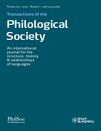
TRANSACTIONS OF THE PHILOLOGICAL SOCIETY
Fostering Innovation in Linguistic ResearchTRANSACTIONS OF THE PHILOLOGICAL SOCIETY, published by Wiley, is a prestigious journal focusing on the fields of linguistics and language studies. With a rich history that spans over 180 years, having been established in 1842, this journal continues to contribute significantly to the academic discourse on language and linguistics. It holds an impressive impact factor and ranks in the Q2 category for both Linguistics and Language in the 2023 category quartiles, underscoring its relevance and scholarly influence, as evidenced by its rankings in the Scopus database. Researchers, professionals, and students will find this journal invaluable for accessing high-quality research articles that illuminate various aspects of language and linguistics. While the journal does not currently offer open access, it remains a vital resource for anyone dedicated to advancing knowledge in these fields. Its address in the United Kingdom underscores its international reach and commitment to academic excellence.

Euskera
Promoting Vibrant Discourse on Basque Identity and LanguageEuskera is a distinguished academic journal dedicated to the study and promotion of the Basque language and culture, published by EUSKALTZAINDIA, the Royal Academy of the Basque Language. With the ISSN 0210-1564, this journal serves as a pivotal platform for researchers, linguists, and cultural scholars to disseminate cutting-edge research and discussions focused on linguistics, language preservation, and Basque identity. Although the journal is not classified as Open Access, it provides comprehensive insights into the advancement of Basque studies and contributes significantly to the field’s academic discourse. Aimed at fostering a deeper understanding and appreciation of the linguistic and cultural heritage of the Basque people, Euskera plays an invaluable role in connecting scholars and practitioners, promoting vibrant scholarly exchanges that enrich both local and global perspectives.
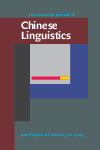
International Journal of Chinese Linguistics
Unraveling the Complexities of Chinese LanguageInternational Journal of Chinese Linguistics is a distinguished publication that delves into various aspects of linguistic studies pertaining to the Chinese language. Published by John Benjamins Publishing Co, this journal stands out for its commitment to advancing the knowledge and understanding of Chinese linguistics within the global academic community. With an impact factor that places it in the Q2 quartile of linguistics and language, the journal is indexed in prominent databases, achieving ranks of #501 in Arts and Humanities and #580 in Social Sciences. These rankings reflect the journal's dedication to maintaining high scholarly standards and its relevance in both linguistic research and practical applications. While not categorized as Open Access, the journal provides necessary access through institutional subscriptions, thereby ensuring that valuable research reaches a broad audience. Covering a wide range of topics from syntax and phonetics to sociolinguistics and applied linguistics, the International Journal of Chinese Linguistics serves as an essential resource for researchers, professionals, and students seeking to deepen their understanding of the intricate relationship between language and culture in the Chinese context. With converging years from 2019 to 2024, it continues to evolve, reflecting ongoing developments in the field.

Language and Linguistics Compass
Fostering Scholarly Dialogue in Linguistic DiscoursesLanguage and Linguistics Compass, published by Wiley, stands as a premier journal in the field of linguistics, showcasing innovative and interdisciplinary research. With its ISSN 1749-818X and E-ISSN matching, the journal has built a robust reputation, achieving an impressive Q1 ranking within the linguistics category for 2023, placing it in the top 4% of its field. Its Scopus rank of 48 out of 1167 highlights its influence and significance among linguistics journals, boasting a commendable 95th percentile. This journal serves as a vital resource for researchers, professionals, and students, offering a wide range of accessible articles that illuminate current trends and advances within the domain of language studies. Although it is not Open Access, the journal is committed to quality and diversity in its publications, ensuring scholarly articles from various sub-disciplines of linguistics are represented from 2008 through 2024. Located in the United Kingdom, Language and Linguistics Compass invites contributions from around the globe, reinforcing its status as a leading forum for linguistic discourse.
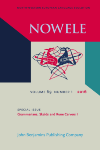
NOWELE-North-Western European Language Evolution
Unveiling the Rich Tapestry of Linguistic ChangeNOWELE-North-Western European Language Evolution, published by John Benjamins Publishing Co, serves as a vital platform for researchers and scholars interested in the evolution and dynamics of North-Western European languages. With an ISSN of 0108-8416 and an E-ISSN of 2212-9715, this journal has been contributing to the field of linguistics since its inception in 1983, with ongoing publications until 2024. Indexed in Scopus and classified in the Q3 category for Linguistics and Language, NOWELE is recognized for its rigorous academic standards and diverse contributions, ranking #485 out of 1088 in the Arts and Humanities category, and #566 out of 1167 in Social Sciences. The journal fosters an open dialogue within the linguistic community, presenting innovative research findings and theoretical advancements. Researchers, professionals, and students alike benefit from its systematic exploration of language evolution in the context of a rapidly changing global linguistic landscape.

Brills Annual of Afroasiatic Languages and Linguistics
Connecting Cultures Through Linguistic InsightsBrill's Annual of Afroasiatic Languages and Linguistics stands as a vital publication in the field of linguistics, specifically focusing on the rich and diverse Afroasiatic language family. Published by the esteemed BRILL, this journal has garnered a reputation for rigorous scholarship since its inception in 2009, converging into its current publication cycle through to 2024. With an ISSN of 1876-6633 and an E-ISSN of 1877-6930, it enjoys a commendable Category Quartile ranking of Q2 in Linguistics and Language for 2023 and respectable Scopus rankings in both Arts and Humanities and Social Sciences. This journal aims to provide a platform for researchers, educators, and students alike, facilitating the dissemination of innovative research, critical analyses, and theoretical advancements within the Afroasiatic linguistic domain. Given its substantial engagement with contemporary linguistics, this annual publication is invaluable for those aiming to deepen their understanding of languages and dialects across the Afroasiatic spectrum.
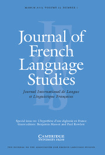
Journal of French Language Studies
Connecting Scholars through French Language ExplorationJournal of French Language Studies, published by Cambridge University Press, is a prestigious and leading journal in the field of linguistics and language that provides a platform for scholarly articles and research findings relevant to the French language and its various dimensions. With an impressive Q1 ranking in the 2023 categorization and ranked #257 out of 1088 in Scopus for Language and Linguistics, this journal plays a pivotal role in advancing the study of French linguistic methodologies, sociolinguistics, and applied linguistics. Since its inception in 1991, the journal has continually contributed to the academic community, attracting innovative investigations and theoretical discussions that enrich understanding and research in the field. Researchers and students enjoy comprehensive access to critical analysis and emerging trends, and as it continues to converge towards 2024, the journal promises to remain an essential resource for exploring the evolving landscape of French language studies.

Language Dynamics and Change
Unraveling the Threads of Linguistic TransformationLanguage Dynamics and Change is a premier academic journal dedicated to exploring the evolution, variation, and transformation of languages over time. Published by BRILL, a reputable name in scholarly publishing, this journal aims to provide researchers, professionals, and students with a robust platform for disseminating cutting-edge findings in the field of linguistics. With an impressive Q1 quartile ranking in the Linguistics and Language category and a commendable ranking of #170 out of 1088 in the Arts and Humanities sector, it occupies a significant position in the academic landscape, showcasing innovative research that fosters a deeper understanding of language dynamics. Although it does not currently offer open access, the journal is committed to enhancing accessibility through various distribution channels. As we look ahead to its convergence period extending until 2024, Language Dynamics and Change continues to affirm its status as a vital resource for advancing the study of language evolution worldwide.
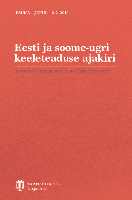
Eesti ja Soome-Ugri Keeleteaduse Ajakiri-Journal of Estonian and Finno-Ugric Linguistics
Unveiling New Horizons in Finno-Ugric LinguisticsEesti ja Soome-Ugri Keeleteaduse Ajakiri - Journal of Estonian and Finno-Ugric Linguistics is a premier academic journal published by UNIV TARTU PRESS, dedicated to advancing the field of linguistics with a particular focus on the Estonian and Finno-Ugric languages. Since its inception, the journal has embraced an Open Access publishing model, allowing researchers and enthusiasts to freely explore its groundbreaking studies and findings since 2013. With an Impact Factor that places it in the Q3 quartile of leading journals within the linguistic domain, it serves as a vital platform for the dissemination of new research and theoretical advancements. Ranked 410th out of 1088 journals in the Arts and Humanities category for Language and Linguistics, it reflects a robust commitment to quality scholarship that appeals to academics, professionals, and students alike. Operating from Tartu, Estonia, the journal aims to foster greater understanding and appreciation of the Estonian language within the broader context of Finno-Ugric studies, making it an essential resource for anyone interested in these unique linguistic cultures.